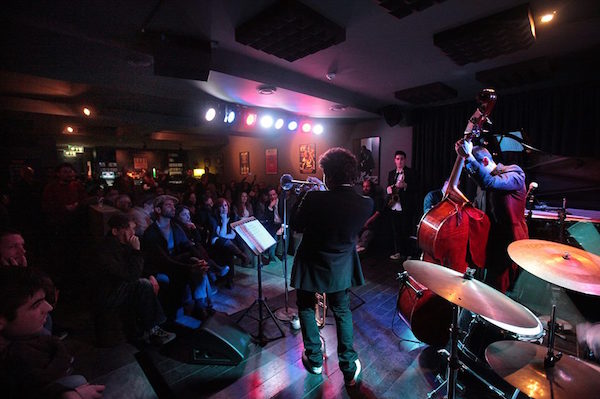Jan 13, 2026 2:09 PM
More Trump-Kennedy Center Cancellations
The fallout from the renaming of the John F. Kennedy Center for the Performing Arts to include President Donald…

Trumpeter Diogo Duque (left), saxophonist Ricardo Toscano and bassist Nelson Cascais onstage at the Hot Clube de Portugal in Lisbon, Portugal.
(Photo: Joaquim Mendes)Nobody knows exactly when jazz first arrived in Portugal, but what we do know the first person to promote jazz in Portugal. That pioneer was Villas Boas (1924–’99). Villas was a jazz fan who befriended many North American musicians and others in the music industry, including fellow promoters such as George Wein. Boas was the first person to host a jazz radio show on local radio in Portugal, and he also founded one of the first European jazz clubs in 1948—Hot Clube de Portugal in Lisbon.
A jazz club aimed at students from local universities existed in Lisbon from 1958–’61 but was shut down by the police due to political reasons. This jazz club booked not only national acts but also international acts, such as Claude Luter, Perry Robinson, Jon Mayer and Chuck Israels.
Five years later, in 1966, the audience for jazz in Portugal was extensive enough that saxophonist Charles Lloyd (accompanied by pianist Keith Jarrett, bassist Cecil McBee and drummer Jack DeJohnnette) appeared on the TV show Jazz no Estudio A, hosted by jazz drummer Jorge Veloso.
Jazz activity continued in Portugal over the decades, with 1971 being a particularly important year. Cascais, a small city by the Atlantic Ocean near Lisbon, presented its first jazz festival, which included performances by Art Blakey, Dizzy Gillespie, Thelonious Monk, Sonny Stitt, Al McKibbon, Kay Winding, Miles Davis, Ornette Coleman, Dexter Gordon and many others.
Charlie Haden also performed at this festival and was arrested by the police because he dedicated his tune called “Song for Che” to “the Black Liberation Movements of Angola, Mocambique and Guine.” This dedication got a standing ovation from 12,000 people.
The Cascais Jazz Festival lasted until the ’80s. Meanwhile, festivals were founded in other cities, such as Porto, Guimaraes, Braga, Estoril, Azores, Madeira, Loule and Coimbra.
Today, the jazz scene in Portugal is very strong and features internationally acclaimed Portuguese musicians such as Esteves da Silva (piano), Maria Joao (voice), Nuno Ferreira (guitar), Luis Candeias (drums), Ricardo Toscano (saxophone), Susana Santos Silva (trumpet) and Carlos Barretto (double bass).
Although there is jazz coverage in the Portuguese media, it is not as widespread as it should be. Cinco Minutos de Jazz (“Five Minutes of Jazz”) is a daily show that has been on air since 1966. In January of this year, Jazzin’, an online radio station at RTP, began. Other than these, there is little broadcasting of jazz.
Jazz on Portuguese TV is even less prominent than its presence on radio. The last jazz TV show took place 16 years ago and it was a one hour weekly show called Jazz a Preto e Branco (“Black and White Jazz”), which was broadcast on RTP.
The LP Estilhacos, now available on CD, was one the first jazz recordings produced in Portugal, documenting a concert in Lisbon of the Steve Lacy/Steve Potts Quintet on Feb. 29, 1972.
In terms of jazz clubs, there is the historic Hot Clube de Portugal in Lisbon, which has hosted Dexter Gordon, Charlie Mariano, Steve Potts, Frank Wright, Count Basie, Noah Howard, Benny Golson and many more. There is another jazz club, Salao Brasil, located in Coimbra. Needless to say, two clubs for a population of 10 million is not great for Portuguese jazz musicians.
There are a few good Portuguese jazz big bands that are successful in Portugal and abroad, including the Orquestra Jazz Matosinhos, Lisbon Underground Music Ensemble (L.U.M.E.) and Tora Tora.
Porta Jazz is an excellent jazz label mainly dedicated to jazz from musicians that live in Porto. Clean Feed is a contemporary jazz label that is quite successful internationally. It releases music by European, U.S. and Portuguese musicians. Among its recent releases are albums by the Francesco Cusa Trio (FCT), the Ada Rave Trio and Gard Nilssen’s Acoustic Unity.
The musicianship of jazz artists in Portugal is almost at the same level as any other European country. However, the support for these musicians needs to grow on many levels. While it’s true that jazz fans in Portugal fill venues, many of them are unaware of all the obstacles that jazz musicians face in this country.
Portugal has existed since the 12th century, and as we look ahead to the remainder of the 21st century, we hope that support for jazz artists here will expand.
For information on the Porta Jazz Association, visit its website.
For extensive information on the jazz scene in Portugal, visit the JazzPortugal website. Journalist José Duarte can be reached at joseduarte@ua.pt DB

Belá Fleck during an interview with Fredrika Whitfield on CNN.
Jan 13, 2026 2:09 PM
The fallout from the renaming of the John F. Kennedy Center for the Performing Arts to include President Donald…

Peplowski first came to prominence in legacy swing bands, including the final iteration of the Benny Goodman Orchestra, before beginning a solo career in the late 1980s.
Feb 3, 2026 12:10 AM
Ken Peplowski, a clarinetist and tenor saxophonist who straddled the worlds of traditional and modern jazz, died Feb. 2…

The success of Oregon’s first album, 1971’s Music Of Another Present Era, allowed Towner to establish a solo career.
Jan 19, 2026 5:02 PM
Ralph Towner, a guitarist and composer who blended multiple genres, including jazz — and throughout them all remained…

Rico’s Anti-Microbial Instrument Swab
Jan 19, 2026 2:48 PM
With this year’s NAMM Show right around the corner, we can look forward to plenty of new and innovative instruments…

Richie Beirach was particularly renowned for his approach to chromatic harmony, which he used to improvise reharmonizations of originals and standards.
Jan 27, 2026 11:19 AM
Richie Beirach, a pianist and composer who channeled a knowledge of modern classical music into his jazz practice,…